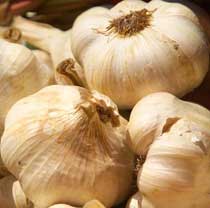Garlic

Photo courtesy of FreeFoto.com
Garlic is closely related to the onion and leek. The large cloved, elephant garlic is really a wild leek, and therefore does not offer the same health benefits as actual garlic.
Ancient Egyptians were the first to cultivate garlic over 5000 years ago. It was considered a sacred food and was used to give strength and endurance to slaves, athletes, and soldiers. It has been used medicinally by many cultures since then, and has recently gained credibility in the west after researchers validated many of its reported health benefits.
| Region: | China, Europe, Argentina, South Asia, the United States |
Health Benefits
| Antibacterial | Shown to be a powerful broad-spectrum antibiotic when eaten raw and crushed. Unlike some standard antibiotics, the body does not become resistant to these natural antibiotics over time. |
| Antifungal | Crushed raw garlic used topically can treat fungal infections, such as athletes food. Too much contact can cause blistering. |
| Antiparasitic | Wards off internal parasites and repels mosquitoes when eaten raw and crushed. |
| Antiviral | Has been used for centuries as a remedy for common illnesses such as cold and flu. Most effective when eaten raw and crushed. |
| Circulation | Improves circulation. |
| Immune System - General | Boosts the immune system when eaten crushed. Most effective when eaten raw and crushed. |
| Lungs | Dissolves mucus in lungs and bronchial tubes, kills bacteria in air passages, prevents respiratory infections. |
| Sinuses | Helps break up mucus congestion. |
| Stomach | Effective against H. pylori, the bacteria that causes ulcers. |
Nutrients
| Sulfur | N/A | N/A |
